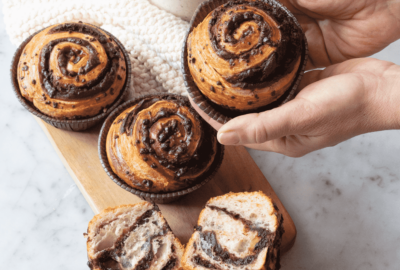A growing n number of people are following special diets and it is vital that caterers are armed with the knowledge to deal with any concerns.
In the UK an estimated two million people are living with a diagnosed food allergy, and 600,000 with coeliac disease. In Ireland, 5% of children and 3% of adults suffffer from a food allergy.
Eating out can be a risk to people with food allergies and legislation, which came into force in 2014, identifified 14 food allergens and made it a legal requirement for catering outlets to ensure information about them is available to customers.
With Anaphylaxsis Awareness Week and Coeliac Awareness Week both taking place this month, we put allergen management procedures under the spotlight and take a look at the FreeFrom products available to help cater for people following special diets.
Legislation now permits schools across the UK to hold spare adrenaline auto-injectors in case of emergencies due to anaphylaxis
ADVICE FOR SCHOOLS
The European Academy of Allergy and Clinical Immunology has published guidelines for schools emphasising the development of age-specifific, whole school, allergy-aware management policies. Simply banning food allergens is not a risk-free solution. Allergy UK has created a self-audit designed to help secondary schools reflflect and review some of the important aspects of managing food allergies. The charity has also produced a New School Allergy Action Group Resource Kit – a free seven-step user-friendly toolkit to help develop a whole school allergy awareness policy for secondary schools.
For more information visit https://www.allergyuk.org/information-andadvice/for-schools/whole-school-allergyawareness-management
KEEPING Y YOUR FOOD ALLERGIC CUSTOMERS SAFE
The Foods Standards Agency has created a checklist to help caterers provide meals for customers with food allergy or intolerance.
- Do your customers find it ‘easy to ask’ for allergen or dietary information? Consider asking your staff to check when taking orders or reservations.
- Do you have a process in place to ensure you can provide a safe meal for someone with an allergy or intolerance to a food? For example:
• Do you provide allergen information in an accessible and upfront manner?
• Do you have accurate recipes for each dish that you serve, so there is a clear list of the ingredients you use in your meals?
• Do you label takeaway meals clearly, so your customer knows which dish is which and what is suitable for those with an allergy? - Do you keep an accurate record of all the allergens in your meals? Do you have reminders in place to update it when you make changes?
- Do you know what your critical control points are within the kitchen and in the storage of ingredients to prevent allergen cross contamination?
- With this assessment in mind, what can be done to remove or reduce risk of allergen cross-contamination? If nothing can be done, be honest and communicate this risk to your customers.
- Have you and your team received suitable allergen training to manage allergens appropriately within the business? Is everyone working at the business clear on what this process is?
Primary schools wishing to receive advice on how to manage food allergies can call Allergy UK on 01322 619898.
COVER ALL BASES
With so many allergens and dietary requirements to consider, canny caterers are opting to us products which cover multiple bases.
“The attributes of FreeFrom sauces ensure that the products can be used to cater for the needs of people following special diets, as well as being part of an everyday menu,” says Alison Smith, global product developer for Mars Foodservice. “For example, when using Dolmio Professional and Uncle Ben’s Professional ready-to-use sauces, caterers can create classic dishes which are free from various allergens such as eggs and fifish, thus helping them to meet the demands of this growing market without having to devise different batches to cater for varying dietary needs.”
Starting with allergen-free base ingredients, such as rice, means caterers can offer flavoursome FreeFrom dishes everyone will enjoy, adds Annette Coggins, head of foodservice, Tilda UK. “As rice is gluten free it is least likely to cause allergies, making it an ideal ingredient for the whole menu from starters and mains to desserts.”
MAKE IT VEGAN THIS SEASON
3% of consumers identify as vegan, while this is only a small proportion of the population, there is wider consumer interest in these options when dining out of home.
“A very happy side effect of the plant based revolution is the wide availability of products suitable for customers with a dairy intolerance. And, as products become more widespread, customers increasingly expect and request them!” comments Olivia Kitching, brand manager for Whirl at AAK Foodservice.
Mintel research shows that oat milk sales rose by 71% in 2019, with purchases worth over £36million. In addition, 23% of people in the UK were using plant-based milks in 2019, a figure that is expected to grow as more caterers offffer non-dairy alternatives. Whirl’s new Whipping Cream Alternative has been developed to meet the needs of anyone who either wants or needs to avoid dairy. As well as dairy-free desserts, it heats up well, making it ideal for creamy pasta dishes, curries and casseroles.
GUIDANCE ON GLUTEN
Estimated to be worth £673million this year, the FreeFrom market has seen double digit growth over the last few years and shows no sign of losing momentum (Coeliac UK, The Gluten Freevolution).
Gluten free products remain the nation’s most popular type of FreeFrom food with 27% of consumers having purchased or eaten these over the past six months. Jonathan Harvey-Barnes, senior business development chef, Essential Cuisine, comments: “As chefs, we know that gluten free is a subject that working kitchens take incredibly seriously. In a recent survey by the Change Group, almost nine out of 10 chefs (89%) said they were taking food intolerances into account when planning menus and at 94%, gluten was the allergen given the most consideration.”
“Kitchens are time pressured places, which is why many of them turn to high quality pre-made stocks as the perfect base of countless menu items. Stocks with no declarable allergens provide much needed consistency and peace of mind for chefs, which is why we’ve moved to make our range entirely gluten free.”
This popularity of gluten free is also being reflected in the cereals category, with FreeFrom cereals seeing 54% sales growth in the last five years (IRI data: SIG Grocery Outlets – Total Free from Breakfast Cereals).
GoFree is the UK’s No. 1 gluten free cereal brand, selling nearly 11 million boxes in the last year, and is available in three variants – Cornflakes and Rice Snaps, which are also vegan, as well as Honey Flakes.



